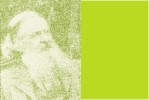Miss
Ophelia Deroy
PhD Student - University of Paris XII, France
PEIRCE AND ANCIENT SKEPTICISMS
ABSTRACT
Peirce refuses violently to be considered as a skeptic, when he is accused
to be one, whereas he expresses his great satisfaction to be said "[un]sure
of [his] own conclusions" (CP 1.10). Doesn't he also defend a form
of radical fallibilism which, as wrote Christopher Hookway, "escapes
skepticism only by a crucial hair's breath"? Can't we so remember those
logical sorites paradoxes, which Peirce and modern logician of vagueness
often quote, that ask what hair is sufficient to pass from baldness to hairiness,
and ask what distinctive feature, added to an initial skepticism, is sufficient
to escape from it?
The subject has been largely debated and would still deserve an interesting
discussion but it is not our point. The purpose of our study will rather
be to clarify what should be held as skepticism and what could Peirce mean
by this term, when he refuses or, as he sometimes does, accept it.
The first point is to depart from the pejorative sense of the word: as shows
the well-known dialogue between Hylas and Philonous written by Berkeley,
it is a very rhetorical topos to accuse the adverse philosophical
position, to be either dogmatic or skeptical; thus, we must be very prudent
in our use of such a polemical vocabulary. Applied principally to Peirce,
it is a narrow escape that we confuse doubt and skepticism: as Victor Brochard
said, in a study on of 1884, which is still a reference today, the doubt
doesn't make the skeptic.
"The true skeptic isn't someone who doubts deliberately, and theorize
about his doubts; it's neither someone who believes nothing and says that
nothing is true, which is another equivocal acceptance of the term : it
is someone who, deliberately and for general reasons, doubts everything
except the phenomenon, and keeps on doubting. "
The pertinence of this last definition will have to be qualified, before
being compared with Peirce's philosophy. It seems indeed necessary to distinguish
between different kinds of skepticism, and every scholar acquainted with
Greek philosophy knows that Pyrrho must not be mistaken neither with Carneades
nor with Sextus Empiricus.
The historical inquiry therefore seems to give the occasion to qualify the
term of skepticism and to specify its links and difference with other philosophical
labels, such as phenomenism, probabilism, empirism, relativism, or positivism,
which are also applied to characterize Peirce's philosophy or pragmatism
in general.
The historical clarification, by exploring the variants of epistemological
and practical postures of Skeptics, allows one to distinguish between different
senses in the accusation raised against Peirce, besides the global accusation
to praise uncertainty. It can also underline different - and changing -
answers to destructive skeptical arguments, or different relationships between
Peirce and such or such kind of skepticism. It will be the occasion to review,
from an historical perspective, the studies and judgements made on skepticism
in the nineteenth century, and to stress a particular admiration for the
New Academy, and then to complete Max Fisch's admirable work on Greek influences
in Peirce's philosophy, with the study of Peirce's scholar knowledge of
Ancient Skepticism.
Besides this terminological worry, the rooting of the debate in Antiquity,
that Peirce both knew and frequented, aims at giving its full consistence
to a perspective often considered as the adversary of philosophers, or at
least, as a negative and temporary experience that is necessary for them.
Do we have to defend ourselves against skepticism or to recognize some skeptical
prudence, to borrow a Greek term that suggests adequately that the problem
extends from theoretical aspects to practical problems? In each of the skeptical
position, from Pyrrhonian conformism to Sextus' proto-positivism, there
is a positive heart of doctrine, which could, with sufficient change, argue
with pragmatism and its common interpretations.
Center
for Pragmatism Studies
Philosophy Graduate Program
Departament of Philosophy
Pontifical Catholic University of São Paulo - Brazil


